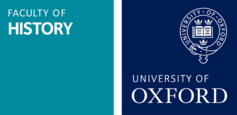The Preliminary Examination in History and Economics is a single nine-month course run by the Faculty of History and the Department of Economics. It does not count towards your final honours degree, but you are required to pass in order to progress into the Final Honour School.
The course consists of four papers. The formal Examination Regulations may be found in Appendix 1. The next sections briefly describe the four units, and full descriptions of each paper can be found on Canvas:
- https://canvas.ox.ac.uk/courses/2212 (Economics)
- https://canvas.ox.ac.uk/courses/22239 (History)
The knowledge and skills you will acquire over the whole course are outlined in Section 2 | Teaching and Learning, which also focuses on the basic skills you need to develop in the first year.
Choosing your Options
In making your choices of period or subject in these four papers, you should be aware that:
- for pedagogical or administrative reasons (such as the wish to teach first-year students within college), some Colleges may restrict the choice of their undergraduates in one or more of British Isles History, the Optional Subject, and Approaches/Historiography/ Foreign Texts.;
- the range of European and World History papers offered in the first year for Prelims differs from that available in the second and third year, examined in Finals.
You must offer four papers as follows.
- Introductory Economics. This paper is compulsory. It is designed to give a solid grounding in microeconomics, macroeconomics, and quantitative methods. Appropriate mathematical techniques are also covered. For descriptions of these papers, see Canvas: https://canvas.ox.ac.uk/courses/22239/modules/items/2946302.
- European and World History (primarily European). A choice of four options is available: 370-900, 1000-1300, 1400-1650, 1815-1914. These papers are studied thematically. For descriptions of these papers, see Canvas: https://canvas.ox.ac.uk/courses/22239/modules/items/294634
- An Optional Subject involving the use of primary sources, including one exclusively created for History and Economics students, ‘Industrialization in Britain and France, 1750-1870'. For descriptions of these papers, and details of the prescribed texts, see Canvas: https://canvas.ox.ac.uk/courses/22239/modules/items/294635
- A paper on Historical Methods. A variety of options are available. ‘Approaches to History’ involves an examination of interdisciplinary ways of studying history and includes a section on ‘Economics and History’; ‘Historiography: Tacitus to Weber’ looks at great historians and their works; and the Foreign Texts option allows students to study one or two seminal historical works in a foreign language (options in Greek, Latin, French, German, Italian, Russian and Spanish are available). For descriptions of these papers, see Canvas: https://canvas.ox.ac.uk/courses/22239/modules/items/294636
(Please note that the Paper IV option Quantification in History is no longer available to History and Economics students.)
Take time to decide your options. Usually your Tutors will advise you to begin by studying the core subjects, among which you have less freedom of choice. When it comes to non- core subjects, there are conflicting pressures. You may well be interested in and enthusiastic about something less mainstream, but such a subject may offer less support to the core subjects and so require greater application. HECO’s great strength is that it can be customized to meet specific needs without a loss of coherence.



